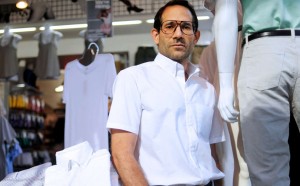 Dov Charney, the CEO and founder of American Apparel was fired this past week due to a company investigation done internally that found he misused company monies and allowed an employee to post photographs of a former female worker who was naked in the photos and had sued him. This is according to one person who is close to the investigation.
Dov Charney, the CEO and founder of American Apparel was fired this past week due to a company investigation done internally that found he misused company monies and allowed an employee to post photographs of a former female worker who was naked in the photos and had sued him. This is according to one person who is close to the investigation.
Charney was offered by the board the opportunity to stay on as a consultant as long as he would resign as the CEO, said two people that have knowledge of what took place, who had spoken on a condition on anonymity.
Charney is said to have refused to step down as CEO and was fired.
While the photos were not published directly by Charney, he did not attempt to stop their publication. Irene Morales, the woman whose naked photos were published, sued Charney during 2011 claiming he forced her into performing sexual acts during a period of many months.
He claimed the photos were evidence she pursued him.
Last March, after finding out that Charney had been aware the photos would be published, the board made a decision to conduct an internal investigation into Charney’s behavior.
That investigation also determined that Charney used the resources of the clothing retailer for personal use.
According to that investigation, he purchased airline tickets for his parents using company money and he along with friends used apartments owned by the company while not carrying out official business.
One person who is close to the founder said his use of the company apartments and monies was appropriate. That person also was insistent that since the blog where the photos had been posted was not created by Charney, then he should not be the responsible party for its content.
Accusations of his behavior and alleged sexual harassment have dogged Charney for years. They appear to at a minimum, be a lurid distraction for the CEO of a company that is publicly traded.
